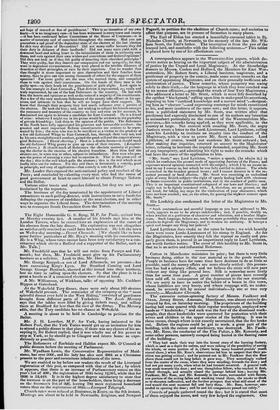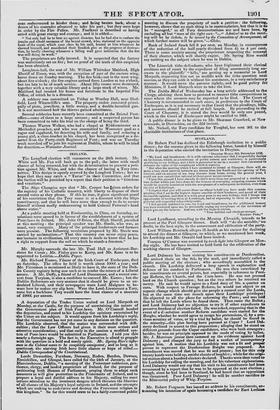Cotton in Manchester maintains its price ; but there is
very little business doing, either in the' raw material or in the goods market. People in business have for some time been desirous to do as little as possible, until the money affairs are more clearly settled : this precau- tion has had a salutary effect, and we believe the crisis will now pass without any thing like general loss. Silk is somewhat more lively than for some time past. A great number of pieces have recently been sold off, in consequence of the depression in the raw material. We are sorry to have to notice the failure of a house in this town, whose liabilities are very heavy, and whose stoppage will, we under- stand, be severely felt by several individuals—by one or two very severely.—Manchester Chronicle. The extensive cotton-spinning factory of Messrs. Faulkner and Owen, Jersey Street, Amcoats, Manchester, was almost entirely de- stroyed by fire, on Saturday morning. The proprietors of the building having had some quarrel with their regular workpeople, employed new hands or " knobsticks ; " and such was the fury of the dismissed work- people, that these knobsticks were quartered for protection with their wives and children in the upper stories of the building. It was in these rooms, though where is not exactly ascertained, that the fire broke out. Before the engines could be got to work, a great part of the building, with the cotton and machinery, was destroyed. Mr. Faulk- ner, Mr. Rose, the conductor of the Fire Police, a Mr. Kennedy, and some other persons, narrowly escaped being buried in the flaming ruins of the building- " They had made their way into the lowest story of the burning factory, which is used as a depot for cotton, and were talking of the possibility of s:fonginf the whole, or some portion of it, (there being many hundred pounds' stored there,) when Mr. Rose's observations led him to suspect that their po- sition was getting critical ; and he pointed out to Mr. Faulkner that the floor above them could not be long before it gave way. They accordingly walked from the centre of the room, where they were standing, towards the door; • and had not got many yards, when what he had foretold occurred. A general rush was made towards the door ; and one thoughtless fellow, who reached it first, bolted through, and actually closed the passage behind him ; leaving Mr. Faulkner, Mr. Rose, and Mr. Kennedy in the room, surrounded with flames, one portion of the ceiling fallen and smoking round them the smoke so thick as to threaten suffocation, and the further prospect that ;hat still stood of the roof would the next moment fall and bury them. Mr. Rose, however, suc- ceeded in opening the doer ; and he and his companions passed out safely."
Crowds of people gathered round the fire ; but it is stated that most of them enjoyed the scene, and very few helped the enginemen, One man endeavoured to hinder them; and being beaten back, about a dozen of his comrades advanced to take his part ; but they were kept in order by the Fire Police. Mr. Faulkner is described as having acted with great energy and courage ; and it is added- " Not only had he to bear up against disaster, but he had also to endure the insults and ribald sarcasms of the brutal crowd, who, stationed on the opposite bank of the canal, which runs close by his mill, hooted at him whenever he showed himself, and manifested their fiendish glee at the progress of destruc- tion, by loudly cheering whenever a falling wall gave indication that the fire was still doing its work."
The proprietors are fully insured. It is suspected that the factory was maliciously set on fire; but no proof of the truth of this suspicion has been obtained.
Loughton-hall, the seat of Mr. William Whittaker Maitland, High Sheriff of Essex, was, with the exception of pea of the eastern wing, burnt down on Sunday morning. The fire broke out in the west wing, about five o'clock ; the fire. engines arrived from London at ten o'clock, but too late to be of much service. About fifty rooms were destroyed, together with a very valuable library and a large stock of wines. Mr. Maitland had insured his house and furniture in the Imperial Fire Office, of which he is a director.
A robbery was committed on Friday at Wortley Hall, near Shef- field, Lord 1Vharneliffe's seat. The property stolen consisted princi- pally of plate, jewellery, a little money, and a double-barrelled gun. It is not mentioned how the thieves gained admittance.
Several robberies have recently been committed at the Bristol Post- office—some of them to a large amount ; and a suspected person has been committed to take his trial on the charge of being the thief. Thomas Warren Walker, who had a chapel at Kidderminster as a Methodist preacher, and who was committed to Worcester gaol as a rogue and vagabond, for deserting his wife and family, and seducing a young girl, a class-teacher in his chapel, has been recognized as a de- serter from the Forty-sixth Regiment of Foot ; and was on Tuesday week marched off to join his regiment at Dublin, where he will be tried for desertion.— Worcester Journal.



























 Previous page
Previous page